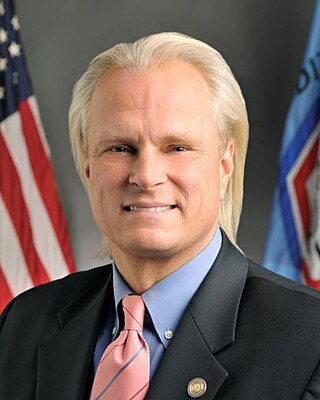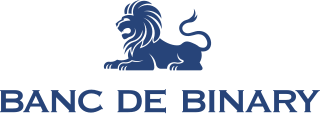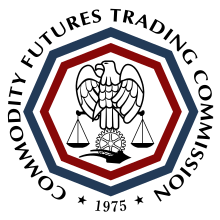
The U.S. Securities and Exchange Commission (SEC) is an independent agency of the United States federal government, created in the aftermath of the Wall Street Crash of 1929. The primary purpose of the SEC is to enforce the law against market manipulation.

In finance, a futures contract is a standardized legal contract to buy or sell something at a predetermined price for delivery at a specified time in the future, between parties not yet known to each other. The asset transacted is usually a commodity or financial instrument. The predetermined price of the contract is known as the forward price. The specified time in the future when delivery and payment occur is known as the delivery date. Because it derives its value from the value of the underlying asset, a futures contract is a derivative.

The Commodity Futures Trading Commission (CFTC) is an independent agency of the US government created in 1974 that regulates the U.S. derivatives markets, which includes futures, swaps, and certain kinds of options.

The Commodity Futures Modernization Act of 2000 (CFMA) is United States federal legislation that ensured financial products known as over-the-counter (OTC) derivatives remained unregulated. It was signed into law on December 21, 2000 by President Bill Clinton. It clarified the law so most OTC derivative transactions between "sophisticated parties" would not be regulated as "futures" under the Commodity Exchange Act of 1936 (CEA) or as "securities" under the federal securities laws. Instead, the major dealers of those products would continue to have their dealings in OTC derivatives supervised by their federal regulators under general "safety and soundness" standards. The Commodity Futures Trading Commission's (CFTC) desire to have "functional regulation" of the market was also rejected. Instead, the CFTC would continue to do "entity-based supervision of OTC derivatives dealers". The CFMA's treatment of OTC derivatives such as credit default swaps has become controversial, as those derivatives played a major role in the financial crisis of 2008 and the subsequent 2008–2012 global recession.
"Gold bug" is a term frequently employed in the financial sector and among economists in reference to persons who are extremely bullish on the commodity gold as an investment and or a standard for measuring wealth. Depending on the circumstances the term can have one or a combination of closely related and often overlapping themes that extend beyond the support for gold as an investment, including in some cases the use of the term as a pejorative.
Foreign exchange fraud is any trading scheme used to defraud traders by convincing them that they can expect to gain a high profit by trading in the foreign exchange market. Currency trading became a common form of fraud in early 2008, according to Michael Dunn of the U.S. Commodity Futures Trading Commission.
Commodity Futures Trading Commission v. Schor, 478 U.S. 833 (1986), was a case in which the Supreme Court of the United States held an administrative agency may, in some cases, exert jurisdiction over state-law counterclaims.
Virtual currency, or virtual money, is a digital currency that is largely unregulated and issued and usually controlled by its developers and used and accepted electronically among the members of a specific virtual community. In 2014, the European Banking Authority defined virtual currency as "a digital representation of value that is neither issued by a central bank or a public authority, nor necessarily attached to a fiat currency, but is accepted by natural or legal persons as a means of payment and can be transferred, stored or traded electronically." A digital currency issued by a central bank is referred to as a central bank digital currency.

The National Futures Association (NFA) is the self-regulatory organization (SRO) for the U.S. derivatives industry, including on-exchange traded futures, retail off-exchange foreign currency (forex) and OTC derivatives (swaps). NFA is headquartered in Chicago and maintains an office in New York City. NFA is a non-profit, independent regulatory organization. NFA does not operate any markets and is not a trade association. NFA is financed from membership dues and assessment fees, and membership is mandatory for many market participants.
Retail foreign exchange trading is a small segment of the larger foreign exchange market where individuals speculate on the exchange rate between different currencies. This segment has developed with the advent of dedicated electronic trading platforms and the internet, which allows individuals to access the global currency markets. In 2016, it was reported that retail foreign exchange trading represented 5.5% of the whole foreign exchange market.
Andrew Maguire is a British commodities trader and whistleblower. He presented evidence to United States regulators alleging that fraud had been committed, and that prices in the international gold and silver markets had been manipulated. No regulatory or legal action has been taken as a result of his accusations.

Bartholomew Hamilton Chilton was an American civil servant.
A Commodity pool operator (CPO) is an individual or organization that solicits or receives funds to use in the operation of a commodity pool, syndicate, investment trust, or other similar fund, specifically for trading in commodity interests. Such interests include commodity futures, swaps, options and/or leverage transactions. A commodity pool may refer to funds that trade in commodities and can include hedge funds. A CPO may make trading decisions for a fund or the fund can be managed by one or more independent commodity trading advisors. The definition of CPO may apply to investment advisors for hedge funds and private funds including mutual funds and exchange-traded funds in certain cases. CPOs are generally regulated by the United States federal government through the Commodity Futures Trading Commission and National Futures Association.
A commodity trading advisor (CTA) is US financial regulatory term for an individual or organization who is retained by a fund or individual client to provide advice and services related to trading in futures contracts, commodity options and/or swaps. They are responsible for the trading within managed futures accounts. The definition of CTA may also apply to investment advisors for hedge funds and private funds including mutual funds and exchange-traded funds in certain cases. CTAs are generally regulated by the United States federal government through registration with the Commodity Futures Trading Commission (CFTC) and membership of the National Futures Association (NFA).
A managed futures account (MFA) or managed futures fund (MFF) is a type of alternative investment in the US in which trading in the futures markets is managed by another person or entity, rather than the fund's owner. Managed futures accounts include, but are not limited to, commodity pools. These funds are operated by commodity trading advisors (CTAs) or commodity pool operators (CPOs), who are generally regulated in the United States by the Commodity Futures Trading Commission and the National Futures Association. As of June 2016, the assets under management held by managed futures accounts totaled $340 billion.
Hunter Wise Commodities, LLC was a privately held Spring Valley, Nevada-based wholesale precious metals trader and financier offering back office accounting services to its clients. The company also had offices in Irvine, California.

Banc De Binary was an Israeli financial firm with a history of regulatory issues on three continents. On January 9, 2017, the company announced that it would be closing due to negative press coverage and its tarnished reputation. The firm also surrendered its brokerage license with the Cyprus Securities and Exchange Commission (CySEC) removing its ability to legally trade in the European Union. Its 2014 revenues were reported as $100 million.

The U.S. Securities and Exchange Commission (SEC) whistleblower program went into effect on July 21, 2010, when the President signed into law the Dodd-Frank Wall Street Reform and Consumer Protection Act. The same law also established a whistleblower incentive program at the Commodity Futures Trading Commission to incentivize reporting of violations of the Commodity Exchange Act, which is run by former senior SEC enforcement attorney Christopher C. Ehrman. The SEC Whistleblower Program rewards people who submit tips related to violations of the federal securities laws. The program offers robust employment protections, monetary awards and the ability to report anonymously. SEC whistleblowers are entitled to awards ranging from 10 to 30 percent of the monetary sanctions collected, which are paid from a replenishing Investor Protection Fund. Since 2011, whistleblower tips have enabled the SEC to recover over $4.8 billion in financial penalties from wrongdoers. The SEC has awarded more than $1 billion to whistleblowers. The largest SEC whistleblower awards to date are $114 million, $110 million, and $50 million.
The forex scandal is a 2013 financial scandal that involves the revelation, and subsequent investigation, that banks colluded for at least a decade to manipulate exchange rates on the forex market for their own financial gain. Market regulators in Asia, Switzerland, the United Kingdom, and the United States began to investigate the $4.7 trillion per day foreign exchange market (forex) after Bloomberg News reported in June 2013 that currency dealers said they had been front-running client orders and rigging the foreign exchange benchmark WM/Reuters rates by colluding with counterparts and pushing through trades before and during the 60-second windows when the benchmark rates are set. The behavior occurred daily in the spot foreign-exchange market and went on for at least a decade according to currency traders.
Spoofing is a disruptive algorithmic trading activity employed by traders to outpace other market participants and to manipulate markets. Spoofers feign interest in trading futures, stocks and other products in financial markets creating an illusion of the demand and supply of the traded asset. In an order driven market, spoofers post a relatively large number of limit orders on one side of the limit order book to make other market participants believe that there is pressure to sell or to buy the asset.








